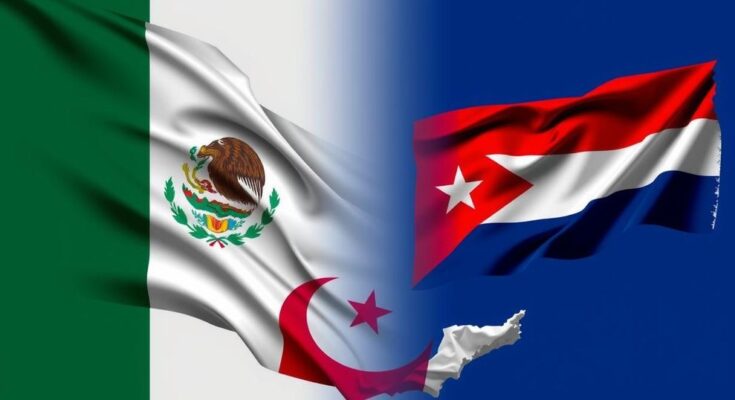Mexico has recently joined Russia and Venezuela in supporting Cuba’s communist regime, becoming its second-largest oil supplier amidst its own domestic crises of violence and instability. This alignment raises concerns about Mexico’s commitment to democratic values and its impact on both nations’ populations.
In recent developments, Mexico has aligned itself with Russia and Venezuela by propping up Cuba’s longstanding communist regime. Historically, Cuba has been heavily reliant on foreign aid, first from the Soviet Union, which contributed over $29 billion in various forms from the 1960s to the early 1990s, followed by Hugo Chavez’s Venezuela, which offered $35 billion predominantly in oil throughout the 2000s. Fast forward to the present, with Venezuela facing its own turmoil, Mexico has stepped in as Cuba’s benefactor, supplying vital resources such as food and oil. This recent alignment has raised alarms, particularly given Mexico’s status as a crucial trading partner with the United States. In 2023, Mexico’s administration not only expressed intentions to cooperate on migration issues but also conditioned this cooperation upon renewed U.S.-Cuba discussions, showcasing a diplomatic maneuver criticized by many. Furthermore, Mexico’s absence from the Summit of the Americas, due to the exclusion of several Latin American dictatorships, added a layer of complexity to its international stance. Amidst an ongoing domestic crisis, characterized by escalating violence and rampant crime, President Claudia Sheinbaum has astonishingly prioritized support for Cuba over addressing pressing issues within Mexico. In 2023, then-President Andrés Manuel López Obrador committed to providing 5.4 million barrels of oil to Cuba—a stark record—valued at $391 million. This gesture of solidarity comes despite Cuba’s notorious human rights abuses, highlighted by the existence of over 1,100 political prisoners and a half-century without free elections. The narrative surrounding Cuba’s struggles often overshadows the failures in management by its government, as the regime deflects blame for economic downturns onto external factors such as oil supply shortages. The repercussions of Mexico’s unwavering support extend beyond Cuba, affecting the Mexican populace as evidenced by one of the largest blackouts in the nation’s history, drawing parallels to conditions in Venezuela prior to its system’s collapse. As of 2023, Mexico has surpassed Russia and may soon outpace Venezuela in oil supply to Cuba, positioning itself as the second-largest supplier. This support undermines domestic democratic principles as Mexico’s government has pursued policies that stifle transparency and centralize power. Ultimately, it is crucial to recognize that Mexico’s backing of the Castro regime is indicative not of solidarity with the Cuban populace, but rather an endorsement of autocratic governance. Genuine support for the Cuban people would necessitate conditional aid contingent upon substantive reforms, including the alleviation of political oppression and fostering democratic practices. The persistence of regimes like Cuba, Nicaragua, and Venezuela is sustained not only by their oppressive tactics but also by the enabling support from nations like Mexico, which paradoxically benefits from the democratic values they ostensibly reject.
The article discusses the historical and contemporary dynamics of foreign support for Cuba’s communist regime, detailing how countries like the Soviet Union and Venezuela have significantly contributed to its sustenance over the years. It emphasizes Mexico’s recent role as a major supporter, particularly in the wake of Venezuela’s crisis, and critiques Mexico’s diplomatic strategies in relation to Cuba while highlighting the domestic challenges Mexico faces, including violence and economic instability. The implications of this support on both nations and their respective populations are crucial to understanding the broader geopolitical landscape in Latin America.
In summary, Mexico’s decision to support Cuba’s dictatorship marks a troubling alignment with authoritarian regimes amidst its own domestic crises. The lack of conditions attached to aid raises questions about Mexico’s commitment to democratic values. Genuine assistance to the Cuban people necessitates advocacy for human rights and democratic reforms, rather than perpetuating authoritarian rule. The ongoing support underscores the complexities of international relations in the region, where traditional democratic principles are often compromised by geopolitical alliances.
Original Source: thehill.com




